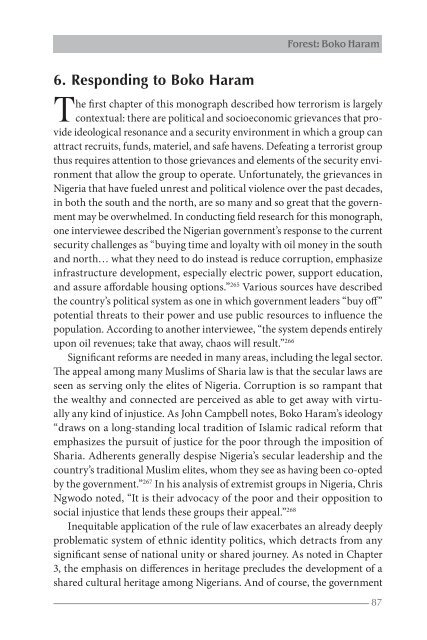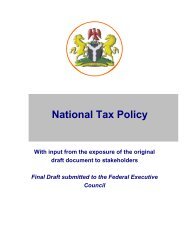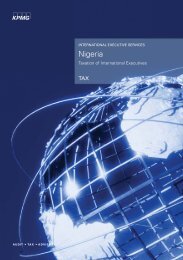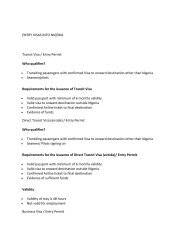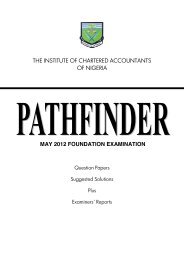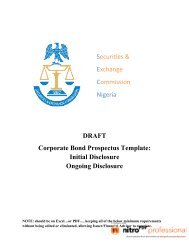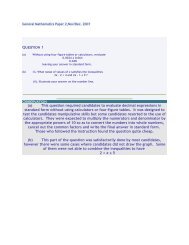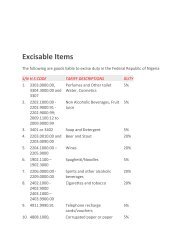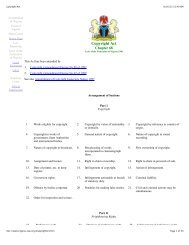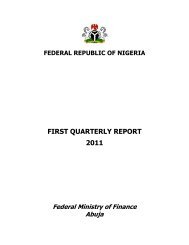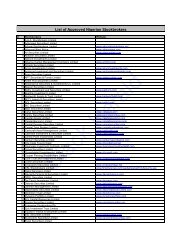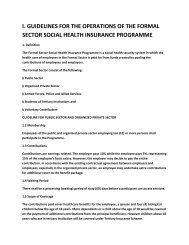Confronting the Terrorism of Boko Haram in Nigeria - Resourcedat
Confronting the Terrorism of Boko Haram in Nigeria - Resourcedat
Confronting the Terrorism of Boko Haram in Nigeria - Resourcedat
- No tags were found...
You also want an ePaper? Increase the reach of your titles
YUMPU automatically turns print PDFs into web optimized ePapers that Google loves.
Forest: <strong>Boko</strong> <strong>Haram</strong>6. Respond<strong>in</strong>g to <strong>Boko</strong> <strong>Haram</strong>The first chapter <strong>of</strong> this monograph described how terrorism is largelycontextual: <strong>the</strong>re are political and socioeconomic grievances that provideideological resonance and a security environment <strong>in</strong> which a group canattract recruits, funds, materiel, and safe havens. Defeat<strong>in</strong>g a terrorist groupthus requires attention to those grievances and elements <strong>of</strong> <strong>the</strong> security environmentthat allow <strong>the</strong> group to operate. Unfortunately, <strong>the</strong> grievances <strong>in</strong><strong>Nigeria</strong> that have fueled unrest and political violence over <strong>the</strong> past decades,<strong>in</strong> both <strong>the</strong> south and <strong>the</strong> north, are so many and so great that <strong>the</strong> governmentmay be overwhelmed. In conduct<strong>in</strong>g field research for this monograph,one <strong>in</strong>terviewee described <strong>the</strong> <strong>Nigeria</strong>n government’s response to <strong>the</strong> currentsecurity challenges as “buy<strong>in</strong>g time and loyalty with oil money <strong>in</strong> <strong>the</strong> southand north… what <strong>the</strong>y need to do <strong>in</strong>stead is reduce corruption, emphasize<strong>in</strong>frastructure development, especially electric power, support education,and assure affordable hous<strong>in</strong>g options.” 265 Various sources have described<strong>the</strong> country’s political system as one <strong>in</strong> which government leaders “buy <strong>of</strong>f”potential threats to <strong>the</strong>ir power and use public resources to <strong>in</strong>fluence <strong>the</strong>population. Accord<strong>in</strong>g to ano<strong>the</strong>r <strong>in</strong>terviewee, “<strong>the</strong> system depends entirelyupon oil revenues; take that away, chaos will result.” 266Significant reforms are needed <strong>in</strong> many areas, <strong>in</strong>clud<strong>in</strong>g <strong>the</strong> legal sector.The appeal among many Muslims <strong>of</strong> Sharia law is that <strong>the</strong> secular laws areseen as serv<strong>in</strong>g only <strong>the</strong> elites <strong>of</strong> <strong>Nigeria</strong>. Corruption is so rampant that<strong>the</strong> wealthy and connected are perceived as able to get away with virtuallyany k<strong>in</strong>d <strong>of</strong> <strong>in</strong>justice. As John Campbell notes, <strong>Boko</strong> <strong>Haram</strong>’s ideology“draws on a long-stand<strong>in</strong>g local tradition <strong>of</strong> Islamic radical reform thatemphasizes <strong>the</strong> pursuit <strong>of</strong> justice for <strong>the</strong> poor through <strong>the</strong> imposition <strong>of</strong>Sharia. Adherents generally despise <strong>Nigeria</strong>’s secular leadership and <strong>the</strong>country’s traditional Muslim elites, whom <strong>the</strong>y see as hav<strong>in</strong>g been co-optedby <strong>the</strong> government.” 267 In his analysis <strong>of</strong> extremist groups <strong>in</strong> <strong>Nigeria</strong>, ChrisNgwodo noted, “It is <strong>the</strong>ir advocacy <strong>of</strong> <strong>the</strong> poor and <strong>the</strong>ir opposition tosocial <strong>in</strong>justice that lends <strong>the</strong>se groups <strong>the</strong>ir appeal.” 268Inequitable application <strong>of</strong> <strong>the</strong> rule <strong>of</strong> law exacerbates an already deeplyproblematic system <strong>of</strong> ethnic identity politics, which detracts from anysignificant sense <strong>of</strong> national unity or shared journey. As noted <strong>in</strong> Chapter3, <strong>the</strong> emphasis on differences <strong>in</strong> heritage precludes <strong>the</strong> development <strong>of</strong> ashared cultural heritage among <strong>Nigeria</strong>ns. And <strong>of</strong> course, <strong>the</strong> government87


